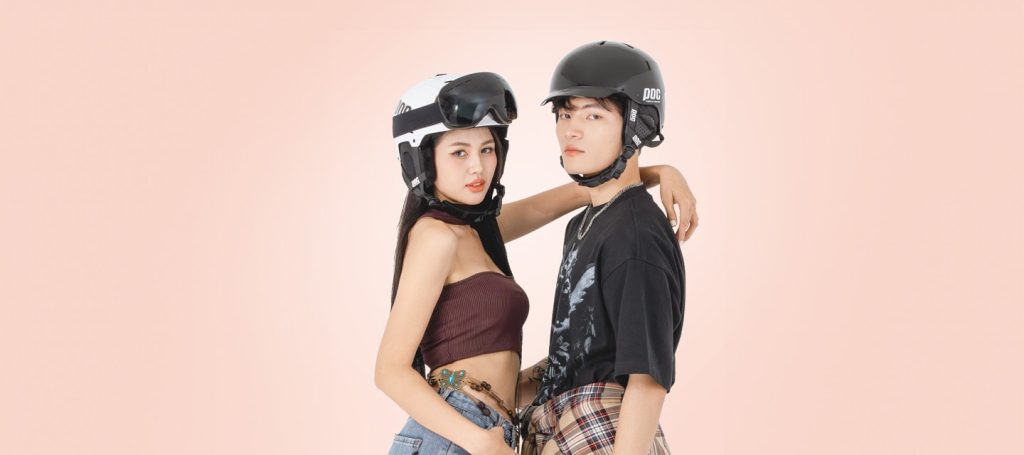When it comes to safety gear for activities like cycling, motorbiking, and skateboarding, helmets are undoubtedly the most important item. While the primary function of a helmet is to protect the head from injury during a crash or fall, its impact extends beyond physical protection. The psychological effects of wearing a helmet can play a significant role in how individuals perceive themselves and interact with the world around them. One such effect is the increase in confidence that comes with wearing a helmet, whether it’s in sports, commuting, or recreational activities.
In this article, we’ll explore the psychological impact of wearing a helmet, focusing on how it can boost confidence and affect one’s mental state. We’ll also examine the broader implications of helmet usage on mental health and decision-making, particularly in the context of urban commuting and extreme sports.
The Role of Helmets in Enhancing Safety and Security
The most immediate benefit of wearing a helmet is its ability to protect against head injuries. Whether you’re cycling through busy city streets, participating in extreme sports, or riding a motorcycle, the helmet acts as a safety barrier. Knowing that your head is protected can have a profound psychological impact, providing reassurance and a sense of security.
Research has shown that when people feel physically protected, their confidence levels rise. The protective nature of a helmet gives individuals the mental space to engage more fully in their activities. This sense of safety is essential for building confidence, especially in environments where risk is inherent, such as urban roads with traffic or high-speed biking tracks.

How Wearing a Helmet Boosts Confidence
1. Reduced Anxiety and Stress
One of the key psychological benefits of wearing a helmet is its ability to reduce anxiety. When engaging in potentially dangerous activities, such as riding a bike in a bustling city or taking on a challenging downhill slope, individuals often experience heightened levels of stress due to the perceived risks involved. A helmet can help alleviate this stress by providing a tangible sense of protection.
The knowledge that you’re wearing a safety device specifically designed to mitigate the risk of head injury can reduce the anxiety that often accompanies high-risk activities. This sense of safety allows individuals to focus more on the task at hand, whether it’s commuting, exercising, or competing, and it helps them to feel more confident in their abilities.
2. Increased Sense of Control
When riding a bike, scooter, or motorbike, the risks involved can sometimes feel overwhelming, especially for new riders or those in unfamiliar environments. Helmets play a crucial role in fostering a sense of control. They remind individuals that they are taking necessary precautions, which in turn can reduce feelings of vulnerability.
With the added protection of a helmet, individuals may feel more confident in their decision-making and actions. For example, someone who is learning how to ride a bike may initially feel nervous, but once they put on a helmet, they might feel more secure, allowing them to take more risks and push their limits in a controlled way.
3. Empowerment in Risky Situations
In extreme sports, such as mountain biking, motocross, or skateboarding, athletes are often faced with situations where risk and uncertainty are part of the experience. In these cases, wearing a helmet can empower individuals to take on challenges that they might otherwise avoid. Helmets act as a psychological armor that helps athletes confront the unknown with confidence.
Studies have shown that protective gear, including helmets, can trigger a psychological response where individuals feel emboldened to take on more significant challenges. Whether it’s attempting a new trick, riding at higher speeds, or navigating a tough terrain, the knowledge that you are protected from injury enables you to approach challenges more confidently.
4. Enhanced Self-Perception and Body Language
The act of putting on a helmet can also affect how individuals perceive themselves. Helmets not only enhance physical protection but also serve as a visible sign of preparedness and responsibility. This can have a positive impact on self-perception, as individuals are reminded that they are taking the necessary steps to protect themselves.
In addition to self-perception, wearing a helmet can influence body language. When individuals feel confident in their safety, they often carry themselves differently. They may stand taller, walk with a more purposeful stride, and approach tasks with greater determination. These changes in body language can further reinforce feelings of confidence and empowerment.
The Helmet Effect in Urban Commuting
Urban commuting is one of the most common contexts where individuals wear helmets, particularly for cycling and electric scooter riding. In city environments, where traffic is often chaotic, and roads are full of obstacles, the psychological impact of wearing a helmet becomes even more pronounced.
1. Greater Willingness to Commute by Bike
The rise of eco-friendly transportation options, such as bicycles and e-scooters, has led to an increase in urban commuting. However, many commuters hesitate to use these modes of transport due to concerns about safety. Wearing a helmet can help alleviate these fears and increase the willingness to commute by bike.
By knowing that their heads are protected, commuters are more likely to embrace cycling or e-scooter riding as a daily mode of transportation. This is particularly important in cities with heavy traffic, where the risk of accidents is high. The confidence that comes with wearing a helmet can lead to a more positive commuting experience, making it an appealing option for those who would otherwise rely on cars or public transportation.
2. Perception of Social Approval
Another psychological benefit of wearing a helmet while commuting is the perception of social approval. In many urban areas, wearing a helmet is considered a responsible choice, and cyclists who wear helmets are often seen as more cautious and safety-conscious. This can lead to positive reinforcement from peers, creating a sense of social validation that boosts confidence.
For many commuters, the idea of fitting in with the safety-conscious community plays a role in their decision to wear a helmet. Social approval can strengthen their commitment to helmet use, reinforcing the positive psychological effects and further promoting a sense of confidence during their commute.
![Top 20+] mũ bảo hiểm ĐẸP và an toàn đúng chất “ngoan xinh yêu”](https://poc-helmet.com/wp-content/uploads/2024/05/mu-bao-hiem-poc-p11-1.jpg)
Psychological Barriers to Helmet Use
Despite the psychological benefits, some individuals still hesitate to wear helmets. Common barriers include concerns about comfort, aesthetics, or a feeling of restriction. However, manufacturers are increasingly addressing these concerns by creating helmets that are lightweight, breathable, and stylish.
By overcoming these psychological barriers, individuals can experience the full range of confidence-boosting effects that helmets provide. As the design and technology behind helmets improve, more people will be encouraged to adopt helmet usage, experiencing enhanced mental well-being and confidence.
Conclusion: Helmets and Mental Well-Being
Helmets are not just a piece of safety gear; they have a profound psychological impact that can significantly enhance an individual’s confidence, self-perception, and overall mental well-being. By providing a sense of security, reducing anxiety, and empowering individuals to take on challenges, helmets play a vital role in promoting mental health during activities like urban commuting and extreme sports.
Whether you’re cycling through the city streets, skateboarding in the park, or participating in a high-adrenaline sport, wearing a helmet can boost your confidence and help you perform at your best. The protective nature of helmets not only safeguards your physical health but also supports your psychological well-being, empowering you to face the world with a renewed sense of self-assurance.
Incorporating helmet usage into daily routines can lead to positive outcomes in both physical safety and mental confidence. So, next time you gear up, remember that the helmet you wear doesn’t just protect your head—it also nurtures a more confident, empowered you.


